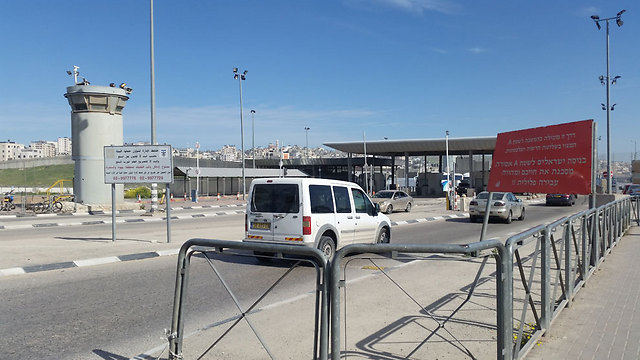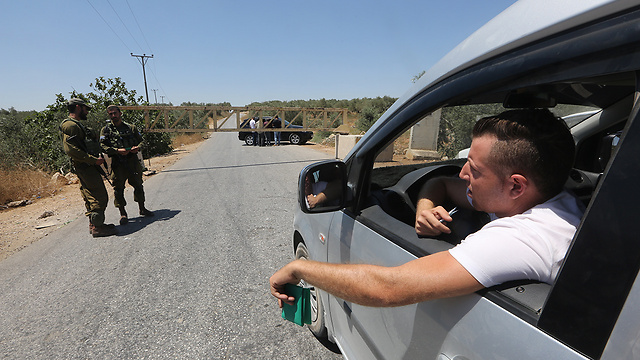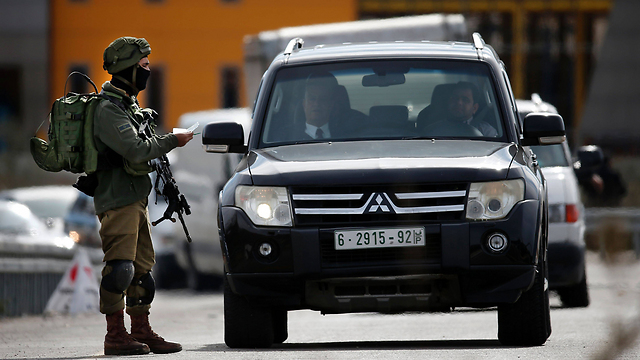

Two sentenced for bribing soldiers, smuggling Palestinians into Israel
Operation ringleader from Qalansawe receives 4 years in prison, NIS 150,000 fine and his West Bank accomplice receives 32 months, NIS 80,000 fine for operation smuggling Palestinians into Israel through Seam Zone checkpoint, bribing soldiers at checkpoint with money, drugs to allow passage without inspection.
The soldiers—serving along the border at a military checkpoint—were arrested in January last year on suspicion of accepting bribes from Ziyad Hadija, a 41-year-old Qalansawe resident, to allow Palestinians to pass through the checkpoint without the required permit.
Hadija was sentenced at the Kfar Saba Magistrates' Court this week and also handed a one-year suspended sentence, along with a NIS 150,000 fine. The court also revoked his driver's license.
His accomplice, Hantash Hantash, 37, from Tulkarm also received a one-year suspended sentence and was ordered to pay a fine of NIS 80,000 for his involvement in the operation.
The pair was found guilty on 13 counts of conspiracy to commit a crime, 12 counts of managing and organizing illegal transportation services for Palestinians, and dozens of counts of attempting to enter Israel and obstructing justice.
Hadija was also convicted of 53 counts of giving bribes to soldiers in exchange for permitting the unauthorized entry of Palestinians into Israel, for possession of dangerous drugs, attempted bribery and other offenses.
Both were convicted following admitting to committing the offenses as part of a plea bargain agreement, with Hadija partially agreeing to the punitive terms and Hantash not agreeing at all.
According to the indictment submitted against the convicts, they conspired to commit a crime with four IDF soldiers who served at one of the checkpoints at the Seam Zone east of the Green Line to carry out their illegal smuggling operation, taking between 300 and 400 shekels for each non-permit carrying Palestinian they transported.
Hadija, the brains behind the operation, arranged for drivers and vehicles to transport the illegal Palestinians from a pickup point in the West Bank to Israel. He also remained in telephone contact with the soldiers and kept them abreast of the driver's details, the vehicle's description and the time of arrival—so they can wave it through without inspection.
Soldiers received drugs and money
On occasion, Hadija would drive his own car to signal to the transporting driver which lane he should go through, where a willing soldier was stationed. When necessary, the soldiers also warned Hadija of any high command or police officials present near the checkpoint, which would make them have to abort or postpone the illegal Palestinians' passage.
For their part, Hadija paid the soldiers NIS 100-150 for every Palestinian to go through their checkpoint, paying them cumulative sums from time to time.
The operation's profits Hadija took for himself, after deducting the soldiers and Hantash's cuts. He also supplied some of the soldiers with cannabis or hashish, used both as bribe and as a means of cementing and strengthening their relationship.
As for Hantash, he was the operation's West Bank contact man, to which most of the illegal Palestinians appealed to enter Israel. Hantash came to an agreement on the cost with the transportees and coordinated and organized the transports based on the desired date and destination.
Hantash also picked up the transportees and drove them within the West Bank to the pickup point, and also collected payments, which he later passed on to Hadija after deducting his share of NIS 100-150 per Palestinian.
Over the course of several months, starting at the end of September 2016 and until they were arrested on January 31, 2017, the pair transported illegal Palestinians on many occasions and in a frequency ranging from several times a day to several times a week.
Both the convicts and the soldiers had no prior knowledge of the Palestinians they were allowing to enter the country without examination—knowing nothing of their family background, religious-ideological affiliation, security background, organizational affiliation, their intentions in Israel or anything else, and made no attempt to ascertain any of the information.


















